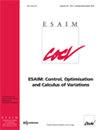线性完全耦合的两类等效的正反向随机微分方程
IF 1.2
3区 数学
Q4 AUTOMATION & CONTROL SYSTEMS
Esaim-Control Optimisation and Calculus of Variations
Pub Date : 2022-05-15
DOI:10.1051/cocv/2022073
引用次数: 0
摘要
研究了两类完全耦合线性正反向随机微分方程(FBSDEs)及其在最优线性二次问题中的应用。在这些族中,可以得到相同的适定性,但系数完全不同。证明了一类FBSDEs在统一方法上是等价的。因此,当一个成员存在唯一解时,就可以得到整个家族的完备性。通过引入线性变换方法,研究了另一类等效的FBSDEs族。由于前向和后向方程之间的耦合结构,导致解之间高度相互依赖。我们可以利用线性变换将FBSDEs解耦成部分耦合,而不失去解的存在唯一性。由于变换矩阵的不简并性,原FBSDEs的解完全由变换后的FBSDEs解决定。此外,还给出了最优LQ问题的一个例子来说明。本文章由计算机程序翻译,如有差异,请以英文原文为准。
Two equivalent families of linear fully coupled forward backward stochastic differential equations
In this paper, we investigate two families of fully coupled linear Forward-Backward Stochastic Differential Equations (FBSDEs) and its applications to optimal Linear Quadratic (LQ) problems. Within these families, one could get same well-posedness of FBSDEs with totally different coefficients. A family of FBSDEs are proved to be equivalent with respect to the Unified Approach. Thus one could get well-posedness of whole family once a member exists a unique solution. Another equivalent family of FBSDEs are investigated by introducing a linear transformation method. Owing to the coupling structure between forward and backward equations, it leads to a highly interdependence in solutions. We are able to decouple FBSDEs into partial coupling, by virtue of linear transformation, without losing the existence and uniqueness to solutions. Moreover, owing to non-degeneracy of transformation matrix, the solution to original FBSDEs is totally determined by solutions of FBSDEs after transformation. In addition, an example of optimal LQ problem is presented to illustrate.
求助全文
通过发布文献求助,成功后即可免费获取论文全文。
去求助
来源期刊

Esaim-Control Optimisation and Calculus of Variations
Mathematics-Computational Mathematics
自引率
7.10%
发文量
77
期刊介绍:
ESAIM: COCV strives to publish rapidly and efficiently papers and surveys in the areas of Control, Optimisation and Calculus of Variations.
Articles may be theoretical, computational, or both, and they will cover contemporary subjects with impact in forefront technology, biosciences, materials science, computer vision, continuum physics, decision sciences and other allied disciplines.
Targeted topics include:
in control: modeling, controllability, optimal control, stabilization, control design, hybrid control, robustness analysis, numerical and computational methods for control, stochastic or deterministic, continuous or discrete control systems, finite-dimensional or infinite-dimensional control systems, geometric control, quantum control, game theory;
in optimisation: mathematical programming, large scale systems, stochastic optimisation, combinatorial optimisation, shape optimisation, convex or nonsmooth optimisation, inverse problems, interior point methods, duality methods, numerical methods, convergence and complexity, global optimisation, optimisation and dynamical systems, optimal transport, machine learning, image or signal analysis;
in calculus of variations: variational methods for differential equations and Hamiltonian systems, variational inequalities; semicontinuity and convergence, existence and regularity of minimizers and critical points of functionals, relaxation; geometric problems and the use and development of geometric measure theory tools; problems involving randomness; viscosity solutions; numerical methods; homogenization, multiscale and singular perturbation problems.
 求助内容:
求助内容: 应助结果提醒方式:
应助结果提醒方式:


